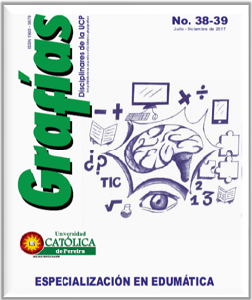The practice of science education in grade first intervened by ICT, as an approximation to the concept of wave
DOI:
https://doi.org/10.31908/grafias.v0i38-39.1366Keywords:
scientific theory of knowledge, science education, multimedia, multimedia narrativeAbstract
In this article there is recaptured the scientific theory of the knowledge exhibited at the beginning of last century, to analyze one of the current problems of the education Colombian and based on the initiative of José Fernando Ocampo to implement in the nation the practice of the Scientific Education, appears in him a methodological proposal applied with students of the first grade, to initiate the formation of advanced concepts of physics by means of the use of virtual ambiences of learning, in these infants who simultaneously are in the process of learning to read.
References
Delval, J. (1997). ¿Cómo se construye el conocimiento? Madrid: Universidad Autónoma de Madrid. Recuperado de http:// antoniopantoja.wanadooadsl.net/recursos/ varios/cons_cono.pdf
Dussel, I. (2010). Aprender y enseñar en la cultura digital. Experiencias y aplicaciones en el aula. Buenos Aires: Fundación Santillana.
Enkvist, I. (2009). La influencia de la nueva pedagogía en la educación: el ejemplo de Suecia. Estudios públicos, (115), 75-114.
ICFES (2013). Colombia en PISA 2012. Informe de resultados. Bogotá: Autor.
ICFES (2016). Estudiantes de colegios oficiales mueven positivamente el examen Saber 11º. Recuperado de http://www2.icfes.gov.co/item/2117- estudiantes-de-colegios-oficiales-muevenpositivamente-el-examen-saber-11
Macedo, B. (1997). La educación científica: un aprendizaje accesible a todos. Proyecto principal de educación en América Latina y el Caribe. Boletín Nº 44. Chile: Oficina Regional de Educación para América Latina y El Caribe, UNESCO.
Ocampo, J. (1994). Tres obsesiones de la práctica pedagógica en Colombia. Revista Educación y Cultura, No. 34 (jul. 1994); p. 35-44
Ocampo, J. (2002). La educación en Colombia. Historias, realidades y retos. Bogotá: Cooperativa Editorial Magisterio.
Tierrablanca, C. I(2009). Desarrollo del pensamiento científico en niños pequeños. México. Revista Magisterio, 48, 20-23.
Tse-Tung, M. (1968). Cinco tesis filosóficas de Mao Tsetung. En Obras Escogidas de Mao Tse Tung. Tomo I (pp. 317 – 332). Pekín: Ediciones en Lenguas Extranjeras.
D. Valencia y G. Cano, (2014). Las TIC y la educación en Transición: perspectiva integradora del pensamiento científico. Trabajo de grado, Especialista en Edumática, Universidad Católica de Pereira.


